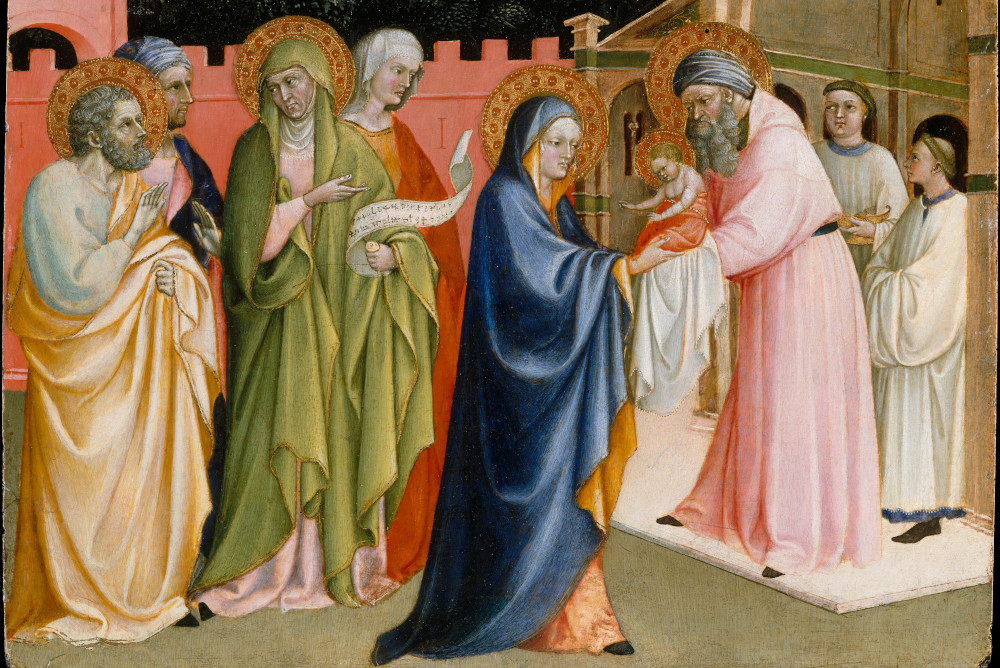
"The Presentation in the Temple" (circa 1430) by Portuguese artist Alvaro Pirez (Metropolitan Museum of Art/Jack and Belle Linsky Collection)
In some parishes, baptisms are the show of the day, uncontrollably susceptible to moments of unanticipated comedy. Small people gather and watch as one or more diapered or naked babies get dunked and cry while the priest prays. Parents' faces nearly break with the size of their smiles; others laugh aloud.
Parish elders know that the laughter should actually have come when the parents and godparents said, "Yes, we fully understand what we are undertaking." The seniors understand that life is a mystery and that the parents don't yet have a clue about what is entailed in raising their little one to live in the freedom of the children of God.
The presentation of Jesus in the Temple was a bit like our baptisms. This was the formal dedication of a firstborn boy to the God who gave him life. Like baptism, it symbolized the child's consecration as part of a people of faith moving toward God.
In our traditions, some families bring the baby dressed in a gown that has passed through the clan, symbolizing ties of faith that link families and generations. Beginning with that gown, the signs of light, the anointing, and passing through the water all symbolize dimensions of the Christian life into which the child is being introduced. The family gathered round may not fully grasp the meaning of each sign, but everybody gets in on the act and somehow understands that every member of the community has been changed and their responsibilities have grown because this new person has been brought into their circle.
That's the dynamic of sacrament: It does what it symbolizes; it changes us in ways we may not fully comprehend.
Luke's depiction of what happened when Joseph and Mary brought Jesus to the Temple is likewise full of symbol and mystery. Prophets like Malachi had promised that the Lord would one day come to the Temple with a power no one could withstand. Luke's story reveals that only saintly seniors recognized the divine visitation in the guise of the infant child of poor, simple parents.
Luke put everything together in this one scene: The parents were fulfilling the law; God appeared in the Temple; the prophets had predicted the coming; the elders celebrated the event. The scene summarized the mystery of God's presence among us: the law, the prophets, tradition and the Temple. And none of it looked like most people would have anticipated.
What are we to take from this memory and celebration? First, it repeats a lesson we resist no matter how often we come up against it: God does not live up to our expectations.
Our personal and communal theologies gravitate to the images of today's psalm, which sings of the King of Glory, the strong, the mighty, the Lord of hosts. We admire that strength. We forget that these images reflect the hope and expectation of a people who believed they were God's chosen ones even when they were beaten down. The people who looked for the King of Glory had been in exile.
In Jesus' day, their nation was occupied by pagan despots. Longing for the opposite of what oppressed them, they envisioned a simple turn of the tables: When God saved them, they, not their enemies, would have all the power. Like us, our Jewish ancestors often ignored the divine maxim: "My thoughts are not your thoughts and my ways are not your ways."
God does not act on our agenda nor fit the cast of characters we would plot out for the salvation of the world. God doesn't turn the tables; God creates and transforms. As Teilhard de Chardin tells us, God is always at work, drawing everything toward the fulfillment of its reason for being. And that has nothing to do with oppression, lack of freedom, or coercion.
Advertisement
We are all a bit like Mary and Joseph and the families bringing their child to God. We continuously stand before the mystery of life. If we are open, we can hear the holy prophets remind us how and where God can be found in it.
Like all parents, each of us is called to labor together with God. We may be young, enthusiastic and optimistic. We might be middle-aged or old enough to have learned that hope is not about expectations but discernment.
No matter our starting point, the feast of the Presentation of the Lord invites us to recognize God's fledgling appearances in our world, to marvel at the mystery and to dedicate ourselves to nurturing it. Simeon promised Mary a broken heart. Anna's joy reminds us that there will also be smiles that almost break our faces and laughter that doubles us over in joy and wonder.
[St. Joseph Sr. Mary M. McGlone is currently serving on the congregational leadership team of the Sisters of St. Joseph of Carondelet.]
Editor's note: Sign up to receive weekly Scripture for Life emails.





